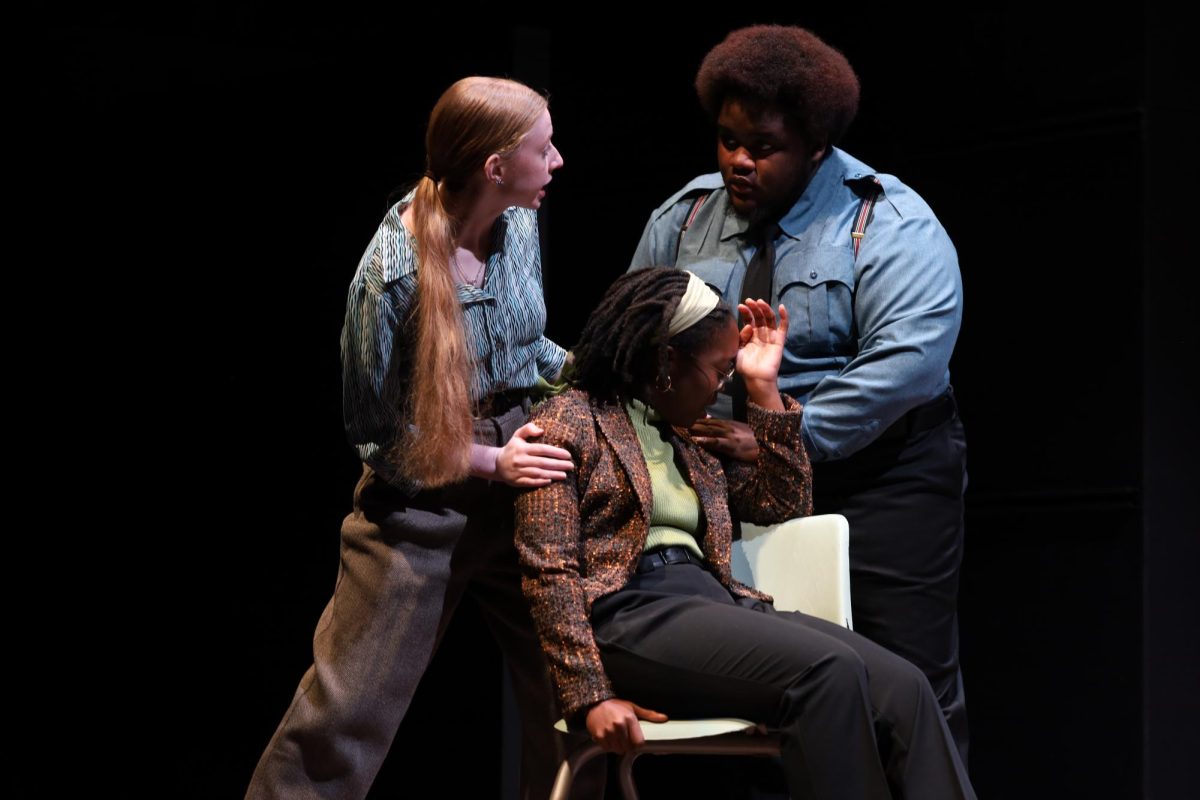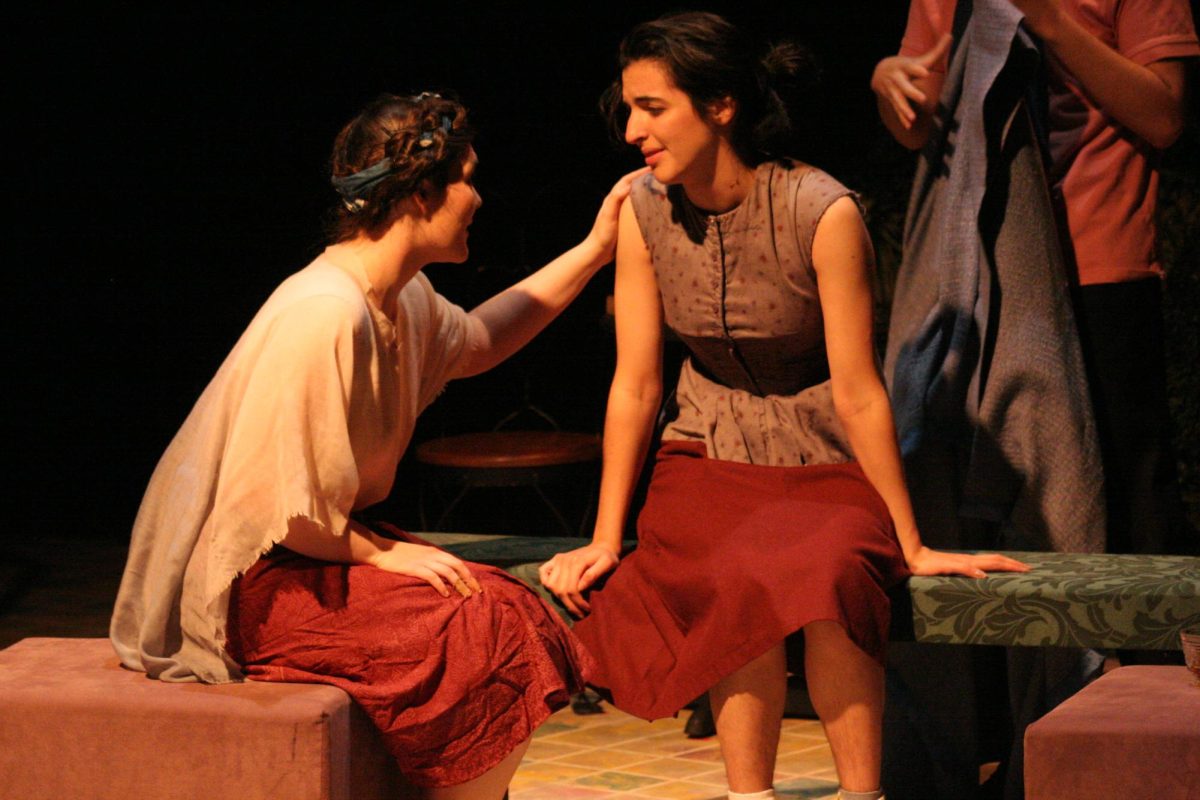This weekend, the Oberlin Theater Department will put on five showings of Dominique Morisseau’s Pipeline, directed by Professor of Theater and Africana Studies Caroline Jackson Smith and held in the Irene and Alan Wurtzel Theater. Pipeline also serves as the senior capstone project for College fourth-year Matsediso Mathebula, who plays the lead.
Pipeline opens with a scene showing Nya Joseph, played by Mathebula, recording a voicemail for her husband Xavier, played by Visiting Assistant Professor of Theater and Africana Studies Preston Crowder, OC ’16, letting him know that their son Omari, College first-year Myles Sead, has gotten in a fight with a teacher at his private school and is now being threatened with expulsion. Nya, in addition to being Omari’s mother, is also a public school teacher at an underfunded school that mostly serves students of color.
This is what makes Nya’s role an interesting one — she has a son who is a victim of the American education system failing Black students, but she is also a teacher in that system. The struggle Nya faces trying to balance being both an authority figure and a concerned mother is one of the core themes of the play, and Mathebula does a stellar job playing both sides of the role.
Other characters include Omari’s girlfriend, Jasmine, portrayed by College second-year Jasmeily Almonte; Nya’s co-worker Laurie, played by College third-year Chloe Sinder; and her other co-worker, school security worker Dun, played by Conservatory third-year Damian Goggans.
Jasmine demonstrates why sending Black children to private schools does not ensure them a better education. She laments about how isolated she feels and that the threats of drugs and teen pregnancy — which her parents were so worried about — are actually more present at her majority white private school.
The isolation that Jasmine and Omari feel is the very reason the latter lashes out at his teacher in the first place. He recounts to his mother that during a reading of the novel Native Son by Richard White, his teacher had tried to make him — the only Black student in the class — respond to the question, “What made Bigger Thomas act like an animal?” and refused to let him skip the question.
The way Black literature is incorporated into the play is a major part of its messaging — the most prominent of which is the 1959 Gwendolyn Brooks poem “We Real Cool.” This piece is recited throughout the play by both Nya and Omari. As Nya is teaching the poem to her students, Omari would quote it to demonstrate his struggles as a Black student, placing emphasis on the line “we / die soon.”
The Brooks poem being weaved throughout the play enhances its message, and through Sead’s powerful acting, its repeated recitations tugged on the emotional heartstrings of the audience members.
The actors were incredibly skilled, elevating the viewing experience of the play. Omari, Nya, and Xavier got into many fights throughout, which documented the complexity of their relationships as well as the larger system they were trying to work through. Their struggle and the many nuances of the issue at hand are effectively translated to the audience.
These aspects were best exemplified by a heated exchange between Nya, Laurie, and Dun, in which Dun criticizes Laurie for getting involved in a fight between two of her students by hitting one of them with a broom. In this argument, the question of whether or not violence should be handled with more violence or by following protocol was represented by Laurie and Dun. Nya brings up a middle ground by showing that more violence does not solve the problem in the long term, while protocol sometimes does not do enough in the moment. It is also worth noting that Laurie is the only white member of the cast, and although she may have good intentions, her character shows how teachers like her will never truly be able to understand the struggle Black students face in a system which sets them up for failure — and even for prison — hence the title Pipeline.
While the acting in the play is its strongest point, the plot brings down the quality. It seems as if Morisseau prioritized her message over the plot. At times, the play feels a little chaotic; rather than being centered on one compelling story, it is constructed with many smaller plotlines brought together, which made it feel a little messy and unengaging. While this ensures that Morisseau’s point gets across, scenes occasionally feel disjointed from each other, and some plot points feel halfhearted or unresolved.
Every other aspect of the play is excellent. The set is extremely versatile and was able to portray everything from a lounge, to a dorm, to a hospital. The score is well crafted, becoming more intense as the show progresses. Jackson Smith’s direction makes the play a success.
As a predominantly white institution, Oberlin has much to learn from Pipeline. It discusses Black students’ experiences in high school and the conversations it inspires are still relevant here. A monologue from Jasmine especially highlights this, as she warns of the isolation she feels being one of the few Black students at her private school. Pipeline ignites powerful narratives about the experiences of students of color which everyone would benefit from understanding.










